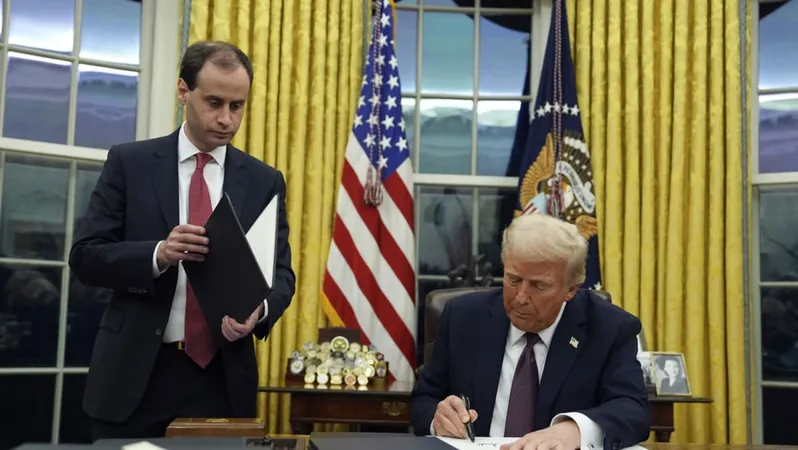
Trump's Controversial Move to Label Drug Cartels as 'Terror Groups' Sparks Concerns for US Businesses
2025-03-25
Author: Rajesh
Introduction
In a bold and controversial initiative, President Donald Trump has designated Mexican drug cartels, including notorious organizations like the Sinaloa Cartel and the Jalisco New Generation Cartel, as foreign terror groups. This decision, which signals an escalation in the United States' ongoing war on drugs, has raised alarms among analysts, suggesting potentially severe repercussions for American businesses operating in Mexico.
The Declaration and Its Context
The formal declaration, made shortly after Trump took office in January, aligns with his administration's strategy to combat the fentanyl crisis that has claimed nearly 75,000 American lives due to overdoses in 2023 alone. Much of this deadly substance enters the United States from across the southern border. In response, Trump has pledged to aggressively combat these cartels, framing this fight as both a public health emergency and a national security threat.
Legal Concerns for Businesses
Experts warn that this new designation could expose American firms to legal ramifications if they inadvertently engage with cartel operations. As noted by Henry Ziemer, an associate fellow at the Center for Strategic and International Studies, the classification allows for the implementation of counterterrorism strategies that can target the financial networks of these groups. However, Ziemer also pointed out the risk: individuals or businesses with any connections to the cartels, even through family remittances, could become entangled in legal troubles if their financial resources are linked to cartel activities.
Risks in Various Industries
Crucially, Ziemer emphasized that criminal organizations have a strong foothold in various industries in Mexico, ranging from agriculture to mining, thereby putting even legitimate businesses at risk of inadvertently supporting a designated terrorist group. “It is essential for American companies to thoroughly vet their suppliers and partners in Mexico,” cautioned Michael Ballard, director of intelligence at security firm Global Guardian. “Consulting with legal experts is crucial to ensure compliance to avoid any association with a foreign terrorist organization.”
Impact on US-Mexico Trade Relations
The implications of Trump’s aggressive anti-drug strategy could extend into the broader trade relationship between the United States and Mexico. Recently, the Trump administration imposed a 25% tariff on certain imports from Mexico, although this decision faced pushback and has since seen a temporary delay. Nevertheless, tensions remain high as the scheduled ‘Liberation Day’ approaches – a term Trump coined to signify his campaign against drug trafficking.
Mexican Government's Response
In response to the pressure from the U.S., Mexican authorities are ramping up policing efforts against cartels and have already extradited 29 cartel members to the United States, including Rafael Caro Quintero, a high-profile drug lord connected to historical crimes dating back to the 1980s.
Potential Military Involvement
With the stakes high, Trump's hints at potentially sending military forces into Mexico to combat these cartels further heighten fears of a military intervention and possible escalation of conflict at America’s southern borders. As the situation develops, both U.S. and Mexican citizens are left wondering about the consequences of this high-stakes strategy in the complex landscape of international drug trade and border security.






 Brasil (PT)
Brasil (PT)
 Canada (EN)
Canada (EN)
 Chile (ES)
Chile (ES)
 Česko (CS)
Česko (CS)
 대한민국 (KO)
대한민국 (KO)
 España (ES)
España (ES)
 France (FR)
France (FR)
 Hong Kong (EN)
Hong Kong (EN)
 Italia (IT)
Italia (IT)
 日本 (JA)
日本 (JA)
 Magyarország (HU)
Magyarország (HU)
 Norge (NO)
Norge (NO)
 Polska (PL)
Polska (PL)
 Schweiz (DE)
Schweiz (DE)
 Singapore (EN)
Singapore (EN)
 Sverige (SV)
Sverige (SV)
 Suomi (FI)
Suomi (FI)
 Türkiye (TR)
Türkiye (TR)
 الإمارات العربية المتحدة (AR)
الإمارات العربية المتحدة (AR)